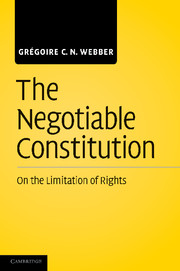Book contents
- Frontmatter
- Contents
- Preface and acknowledgements
- Introduction: on the limitation of rights
- 1 The constitution as activity
- 2 The received approach to the limitation of rights
- 3 Challenging the age of balancing
- 4 Constituting rights by limitation
- 5 The democratic activity of limiting rights
- 6 Justifying rights in a free and democratic society
- Conclusion
- Bibliography
- Index
1 - The constitution as activity
Published online by Cambridge University Press: 30 March 2010
- Frontmatter
- Contents
- Preface and acknowledgements
- Introduction: on the limitation of rights
- 1 The constitution as activity
- 2 The received approach to the limitation of rights
- 3 Challenging the age of balancing
- 4 Constituting rights by limitation
- 5 The democratic activity of limiting rights
- 6 Justifying rights in a free and democratic society
- Conclusion
- Bibliography
- Index
Summary
Introduction
The constitution of a democratic constitutional State, and especially constitutional rights, ought to remain open, on an ongoing basis, for democratic re-negotiating. This is the claim defended in this chapter, and throughout this book. The claim is structured around the idea of political legitimacy. It will be contended that a constitution seeks to approximate a reconciliation of two principles of political legitimacy: the principle of democracy and the principle of human rights. By assuming that a constitution successfully reconciles these principles, constitutional scholarship has tended to look to a constitution as an end-state: a final reconciliation of the principles of political legitimacy. Democratic activity must operate within constitutional constraints, but should refrain – except exceptionally – from challenging the constitution. This view, I endeavour to show, should be rejected. A constitution should not be understood as a completed project; rather, consistent with political legitimacy, one should conceive of a constitution as an activity.
The argument of this chapter, like the argument pursued throughout the chapters of this book, will be developed with special reference to a written constitution. The focus will be on constitutional rights, such as those enumerated in the US Bill of Rights, the Canadian Charter of Rights and Freedoms, the Basic Law for the Federal Republic of Germany, and the Constitution of South Africa. The argument will no doubt extend to other features of a constitution, such as the catalogue of jurisdictional powers awarded to federal and state legislatures.
- Type
- Chapter
- Information
- The Negotiable ConstitutionOn the Limitation of Rights, pp. 13 - 54Publisher: Cambridge University PressPrint publication year: 2009
- 1
- Cited by

